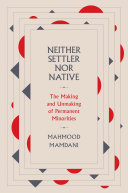
- This event has passed.
Harvard Book Store Virtual Event: Mahmood Mamdani
January 22, 2021 @ 7:00 pm

Presenting Neither Settler nor Native: The Making and Unmaking of Permanent Minorities
Harvard Book Store’s virtual event series welcomes MAHMOOD MAMDANI—the Herbert Lehman Professor of Government at Harvard University and author of Define and Rule: Native as Political Identity—for a discussion of his latest book, Neither Settler nor Native: The Making and Unmaking of Permanent Minorities.
Contribute to Support Harvard Book Store
While payment is not required, we are suggesting a $3 contribution to support this author series, our staff, and the future of Harvard Book Store—a locally owned, independently run Cambridge institution. In addition, by purchasing a copy of Neither Settler nor Native on harvard.com, you support indie bookselling and the writing community during this difficult time.
About Neither Settler nor Native
In this genealogy of political modernity, Mahmood Mamdani argues that the nation-state and the colonial state created each other. In case after case around the globe—from the New World to South Africa, Israel to Germany to Sudan—the colonial state and the nation-state have been mutually constructed through the politicization of a religious or ethnic majority at the expense of an equally manufactured minority.
The model emerged in North America, where genocide and internment on reservations created both a permanent native underclass and the physical and ideological spaces in which new immigrant identities crystallized as a settler nation. In Europe, this template would be used by the Nazis to address the Jewish Question, and after the fall of the Third Reich, by the Allies to redraw the boundaries of Eastern Europe’s nation-states, cleansing them of their minorities. After Nuremberg the template was used to preserve the idea of the Jews as a separate nation. By establishing Israel through the minoritization of Palestinian Arabs, Zionist settlers followed the North American example. The result has been another cycle of violence.
Neither Settler nor Native offers a vision for arresting this historical process. Mamdani rejects the “criminal” solution attempted at Nuremberg, which held individual perpetrators responsible without questioning Nazism as a political project and thus the violence of the nation-state itself. Instead, political violence demands political solutions: not criminal justice for perpetrators but a rethinking of the political community for all survivors—victims, perpetrators, bystanders, beneficiaries—based on common residence and the commitment to build a common future without the permanent political identities of settler and native. Mamdani points to the anti-apartheid struggle in South Africa as an unfinished project, seeking a state without a nation.
Praise for Neither Settler nor Native
“In elegant prose with no wasted words or jargon, this original and brilliant work argues that the United States created the template for settler-colonialism, providing the model upon which the South African apartheid regime and the Israeli state were patterned, a model also used by the Nazi regime that adopted US race theory and catastrophic ethnic cleansing.” —Roxanne Dunbar-Ortiz, author of An Indigenous Peoples’ History of the United States
“Brilliant! A deeply learned account of the origins of our modern world. Situating the beginnings of the nation-state in the settler-colonial practice of creating permanent minorities, Mamdani illustrates how this damaging political logic continues into our own era, resulting far too often in today’s extraordinary political violence. Through his own elegant contrarianism, Mamdani rejects the current focus on human rights as the means to bring justice to the victims of this colonial and postcolonial bloodshed. Instead, he calls for a new kind of political imagination, one that will pave the way for a truly decolonized future.” —Moustafa Bayoumi, Brooklyn College, City University of New York
“Neither Settler nor Native analyzes seemingly disparate political histories to illuminate the intertwined logic of colonial statecraft and nation-building, the legacy of which was the violent manufacture of permanent majorities and minorities the world over. This is a masterwork of historical comparison and razor-sharp political analysis, with grave lessons about the pitfalls of forgetting, moralizing, or criminalizing this violence . . . Decolonization uses the tools of political engagement and negotiation to unsettle inherited identities, to convert perpetrators and victims into survivors, natives and settlers into citizens, nation-states into inclusive democracies.” —Karuna Mantena, Columbia University